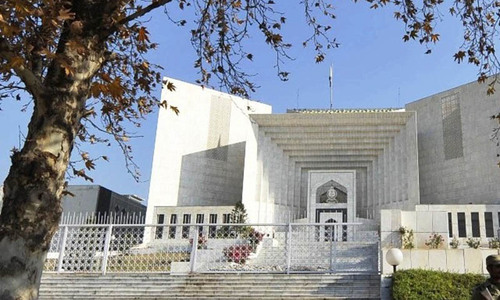ISLAMABAD: The Supreme Court has been asked to set aside its registrar office decision of returning a plea for live-streaming or broadcast of the hearings of cases of public importance, particularly those under Article 184(3) of the Constitution.
The fresh appeal has been moved by senior Pakistan Bar Council (PBC) member Raheel Kamran Sheikh, who sought a declaration from the apex court that any blanket ban or prohibition on the live-streaming of proceedings in the apex court as arbitrary and discriminatory, besides being violative of the fundamental rights of citizens including the right of access to justice, the right to information and the right to fair trial.
On March 15, the registrar office of the apex court had returned a petition citing reasons that the petitioner had directly approached the apex court instead of moving it first before any other appropriate forum available to him under the law for the same relief. Moreover, the petition has also failed to provide any justification for directly filing the petition in the SC.
SC urged to declare prohibition on live-streaming of proceedings as arbitrary and discriminatory
In the fresh application, the petitioner contended that the registrar office decision was misconceived, unsustainable and not only erroneous in law but also against the fundamental principles of justice, equity and good conscience and amounts to usurpation of the original jurisdiction of the apex court.
The applicant pleaded that the administrative order was unsustainable in law as it failed to take into consideration that the appellant/petitioner in his constitutional petition under Article 184(3) had raised questions of public importance with reference to enforcement of fundamental rights conferred on citizens and that the Supreme Court has been very much conferred with the jurisdiction to entertain such petitions without prejudice to the provisions of Article 199 of the Constitution.
The objection regarding not approaching another appropriate forum, in other words the non-availing of the alternative remedy by the petitioner was clearly misconceived, the appeal argued, adding that the jurisdiction under Article 184(3) was only subject to such restrictions or limitations as were expressly specified.
For consideration of the SC, the petitioner asked if the non-permissibility of live-streaming/broadcast of proceedings in matters of public importance did not violate fundamental rights of citizens, particularly the right of access to justice without any discrimination.
According to the petition, this is manifestly a question of public importance in relation to the enforcement of fundamental rights embodied in Chapter I of Part II of the Constitution. So long as any question of public importance in relation to the enforcement of any of the fundamental rights is raised before the SC, the petition under Article 184(3) is maintainable and availability of alternative remedy, if any, not being one of the restrictions or limitations specified in Article 184(3), is of no consequence and does not provide any basis for refusing to entertain and adjudicate upon such a petition.
The appeal highlighted that the office could only raise objections which were limited to observations regarding administrative requirements necessary for the court to entertain an appeal, petition or application.
The reasons stated in the office order clearly did not relate to administrative requirements but touched upon maintainability of the petition, which only the bench constituted under Rule 7 of Order XXV hearing the petition had jurisdiction to raise and adjudicate upon, the appeal insisted.
The petition, therefore, could not be returned without any adjudication by the bench comprising not less than two judges of this august court. “Therefore, the order appealed from is not warranted by law thus liable to be set aside,” the petition contended.
Published in Dawn, April 21st, 2019















































Dear visitor, the comments section is undergoing an overhaul and will return soon.